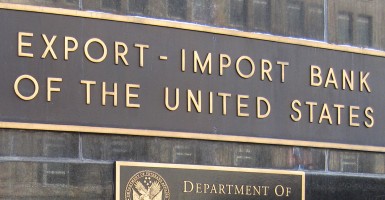A coalition backing government export subsidies will host several executives of purportedly “small” businesses at a briefing Tuesday to build support for the Export-Import Bank (Ex-Im). Although the bank primarily benefits very large corporations, advocates are telling Congress and the public that the bank is crucial to the survival of small firms. If that was true, they could have made a better case by featuring speakers from actual small businesses.
Ex–Im provides loans and loan guarantees as well as capital and credit insurance for U.S. exports. Its current authorization will expire on Sept. 30, and the Obama administration is seeking a five-year renewal and a $20-billion increase in its lending cap.
The bank categorizes manufacturing firms with up to 1,500 workers as “small,” as well as retailers with revenues that exceed $21.5 million.
Advocates know better than to parade before Congress executives from Boeing, Westinghouse, Caterpillar, Bechtel or any of the other large corporations that reap the benefits of more than 80 percent of Ex-Im subsidies. Instead, a coalition of interest groups apparently hope that representatives of smaller firms will tug at the heartstrings of lawmakers who remain (rightly) skeptical about reauthorizing an agency rife with corruption, and which violates fundamental principles of free enterprise. (Not to mention subsidies to the likes of Russia, China and Venezuela.)
But what constitutes a small business under the Ex-Im regime is not what most Americans would consider to be so. For example, the bank categorizes manufacturing firms with up to 1,500 workers as “small,” as well as retailers with revenues that exceed $21.5 million. Interest group officials apparently think likewise.
For example, Tuesday’s briefing will feature:
- Optical Cable of Roanoke, VA. The company manufactures fiber optic cable for commercial and military use. Its consolidated net sales for the second quarter totaled $20.2 million. Morningstar analysts put its market cap at $29.6 million.
- Air Tractor, Olney, TX. The manufacturer is the world’s leading producer of aircraft used in agricultural. Businessweek reports that the company has affixed armor plating, sensors, and weapons onto planes originally designed to dust cropland for sale to the United Arab Emirates, and hired a marketing executive to find additional customers. According to BrightScope, Air Tractor’s the assets of the employee stock ownership plan exceeded $78 million in 2012.
- Goss International, Durham, NH. The company supplies presses and finishing for magazine, newspapers, catalog, and other printing applications. It has major manufacturing centers in North America, Asia and Europe. Goss is a subsidiary of the Shanghai Electric (Group) Corporation, which has annual revenues exceeding $12 billion.
- Global Traders Inc., Brooklyn, NY. GTI is an international trading and financing firm with offices and agents in Tunisia, Paris, Brazil, Ghana, Guinea and Senegal. Manta pegs its annual revenues as $2.5-$5 million.
- BTE Technologies, Baltimore, MD. The company provides advanced physical therapy systems for clinics, hospitals, and private practices. It has been granted some 97 contracts with the Deptartment of Defense, the Veterans’ Administration, the Government Services Administration, and the Deptartment of Health and Human Services. According to InsideView, GTI has revenue of $14 million.
Make no mistake—the success of the companies listed above is to be celebrated. But lawmakers should not be fooled that this success represents in any way the value of the Export-Import Bank. In actuality, the bank harms many American small businesses and their workers by subsidizing their foreign competitors.
The reauthorization debate has made this once obscure agency a topic of national interest. In so doing, Americans have learned a great deal about Ex-Im, much of it not very pretty. There have been allegations of corruption, extensive documentation of mismanagement, and a penchant for largesse to multinational corporations that could easily access private financing.
No matter what advocates try to claim about its benefits, there is not even a small justification for reauthorization of the Export-Import Bank.





























